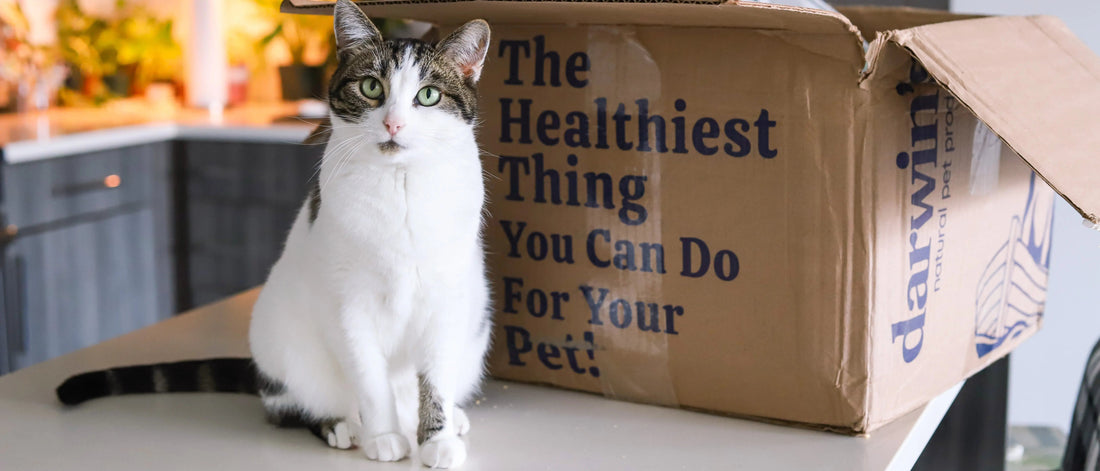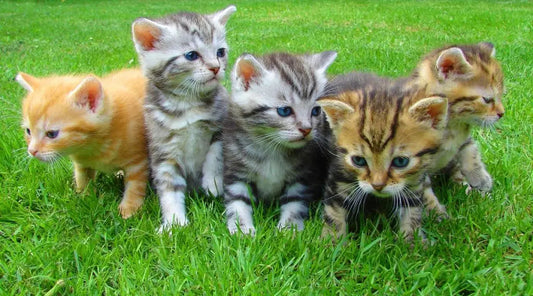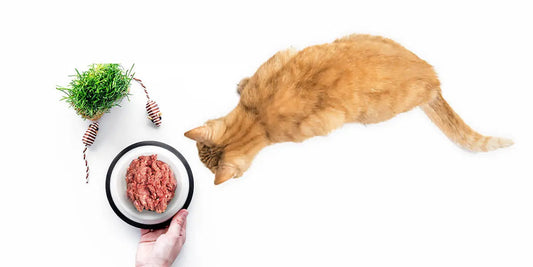
Is Chicken Good for Cats? Everything You Need to Know
When we talk about feline nutrition, one of the most common questions is whether chicken is good for cats. As a lean source of protein, chicken delivers nutritional benefits for cats. However, pet owners have to understand how to fit chicken into their cats’ dietary needs.
Plain, raw, cooked, and unseasoned chicken is all safe and beneficial for cats. Because cats are obligate carnivores, chicken meat is more than a meal; it is a biological necessity. With that in mind, let’s take a look at the nutritional benefits of chicken for cats, and how to feed a cat properly.
Can Cats Eat Chicken Every Day Safely?
Cooked, unseasoned chicken—and in some cases, raw chicken—is safe and healthy for cats when handled and served properly. Chicken is a good source of protein, amino acids, and essential nutrients. With plenty of vitamins and minerals, chicken provides cats with ingredients vital for bodily functions, including vision, heart, and reproductive health.
While many cats find chicken appealing, there are still some guidelines on how to serve it properly. Besides helping maintain and build muscle, chicken improves bone health and teeth. Freeze-dried chicken hearts can also be excellent cat treats when given occasionally. Nutritional profile of 3 oz (85g) of skinless chicken breast:
-
24g of protein
-
3g of healthy fats
-
Virtually no carbohydrates
-
Micronutrients like vitamin B3, selenium, phosphorus, vitamin B6, vitamin B12, and smaller amounts of zinc and potassium
Despite the health benefits, there are some considerations when feeding chicken daily to cats. Avoid adding salt, spices, or oils to the chicken, and remove bones and skin to prevent choking or internal injury. If feeding raw chicken, use only high-quality, human-grade meat and follow safe handling practices to reduce the risk of bacterial contamination. Feeding only chicken—whether cooked or raw—can lead to nutrient imbalances, particularly in taurine, calcium, and essential fatty acids. Cats need balanced nutrition that delivers a broader range of essential nutrients. As with any food a cat eats, monitor for adverse reactions.
What Is the Best Form of Chicken for Cats?
For cats, a balanced diet is more than a luxury; it is a necessity. Cats, being obligate carnivores, have a unique set of dietary requirements. They thrive on high-protein meals, essential nutrients, and vitamins found in animal tissues. While cats would have trouble catching and eating them in the wild, chicken meat is one of the most common food sources for felines. Chicken comes in many different cuts and forms, from chicken breasts and wings to cooked, raw, and canned chicken. With so much variety, what is the best type of chicken for feline companions?
Should Cats Eat Raw Chicken?
In the last several years, there has been an ongoing debate in the pet world about whether raw chicken for cats is better than cooked. There are many proponents on both sides. Supporters of raw feeding point to cats’ natural instincts and the success of wild felines thriving on freshly caught prey.
When properly balanced and safely prepared, raw diets can offer benefits like improved digestion, healthier coats, and higher energy levels. However, raw meat (including chicken) can carry harmful bacteria such as Salmonella or E. coli, posing risks to both cats and their humans.
That’s why many pet owners turn to Darwin’s Natural Pet Products. Our raw cat food is made from high-quality, human-grade ingredients sourced in the U.S. and processed with safety in mind. You get the nutritional benefits of raw—without the mess, stress, or health risks of preparing it yourself. It’s raw feeding, reimagined for modern pet parents.
Can Cats Eat Canned Chicken?
Canned chicken is generally safe for cats, but there are downsides to feeding it. First and foremost, canned chicken contains more salt than cats should consume daily. Additionally, some brands add spices that have no place in feline nutrition. Sometimes, pet owners can share a small amount of unflavored, canned chicken that has been well rinsed to remove the excess sodium. But it is not ideal as a daily component of your cat's food routine.
Can Cats Eat Fried Chicken?
Fried chicken is something pet owners should not share with their feline companions. Fried chicken comes with plenty of spices, breading, and fat. All of these ingredients are empty calories for cats. Plus, they can cause digestive stress.
Can Cats Have Chicken Broth?
Chicken broth is a safe alternative for cats, but there are a few caveats. Look for broths that do not have a high salt content or any flavorings. Spices and flavorings present a toxicity risk for cats. It is best that you cook it yourself and give it to cats as extra hydration.
Can Cats Eat Chicken Bones?
Chicken bones are the most dangerous part of the chicken. While chicken meat is safe for cats, bones are not. They can splinter, resulting in cats digesting small pieces that can damage the throat and internal organs.
How to Add Chicken to Your Cat’s Routine
Chicken should be introduced methodically and gradually to feline nutrition. Cats need a diet that is nutritionally balanced, and chicken is one of the best animal proteins. Here is a step-by-step guide on how to prepare and add chicken to cats’ nutrition.
-
Opt for minimal processing of chicken meat. Always prepare chicken meat without any oils, seasonings, or spices.
-
While chicken breasts are probably the best part of the chicken, variety is the key. There are other parts of chicken that can serve as occasional treats, including chicken hearts and chicken liver.
-
Opt for quality over quantity, sourcing fresh chicken from reputable companies and manufacturers.
How much chicken can cats eat?
Even the healthiest foods can cause problems when you cross the line. It is easy to overfeed chicken to cats and upset their delicate balance of nutrition. Pet owners should keep chicken portions small. As a rule of thumb, cats over six months of age should have up to two tablespoons of plain chicken per day.
Why Chicken Might Be the Best Protein for Your Cat
Chicken comes in a variety of cuts, providing between 20 and 30g of protein per serving. All chicken parts are high in protein, with breasts often favored by pet owners. For feeding chicken daily, pet owners should look for cuts that are low in fat, avoiding things like thigh, drumstick, and wings. With that in mind, let’s also take a look at how chicken compares to other popular protein sources, like fish and beef.
Chicken vs. Fish
Chicken and fish are two of the best lean proteins. As carnivores, cats need animal protein to maintain weight, support bodily functions, and aid in muscle growth. Both chicken and fish are good sources of B vitamins, but which is healthier?
On one hand, chicken is one of the most readily available and relatively budget-friendly protein sources on the market. Chicken breasts, for example, are almost completely fat-free when prepared without the skin.
Fish, while a great source of protein, also provides omega-3 fatty acids. Most of the omega-3 fatty acids are found mainly in fish and shellfish. Premium fish also contain potassium, calcium, and magnesium, three minerals essential for healthy bones.
Both chicken and fish are part of a healthy, balanced diet. They provide different nutrients needed for your cats’ overall health. The difference is that chicken is relatively cheaper and lower in fat. It is best that you provide both sources so that cats get all of the essential nutrients they need for a healthy life.
Chicken vs. Beef
Another common source of protein is beef. While cats would never be able to catch cows in the wild, they can have beef meat and treats. So, is beef good for cats? In moderation and when properly sourced, yes, it can be a beneficial protein source.
Comparing the two, chicken delivers high-quality lean protein which can be prepared in different ways and cuts. Chicken is easier to incorporate into a balanced diet. Chicken is richer in B vitamins, including niacin and B6.
Beef cat food, on the other hand, is richer in iron, zinc, and vitamin B12. The downside of beef is that it contains more fat than chicken. While lean cuts have lower fat content, they come with a relatively higher price tag.
Like with fish, it is a good option to provide both protein sources for cats. While chicken is a great animal protein, it lacks minerals like iron. Some pet parents rotate between chicken and beef to give cats the best of both worlds. Wondering, “is turkey good for cats too?” Turkey cat food is another lean protein that can support feline nutrition, as long as it’s cooked plain and served in small portions.
How Darwin’s Takes Care of Your Pet
At Darwin, we believe your pets deserve premium quality. That is why we use only fresh, whole USDA-quality ingredients when preparing meals for pets. We source ingredients from farms that we trust, building a partnership throughout the years. To ensure safety, we consult with veterinarians for our recipes, having them review each and every dish that we deliver to pet parents. We believe in raw meat and fresh cat food are the best options for pets. Because when it comes to your pet’s health, only the highest standards will do.
Sources:


